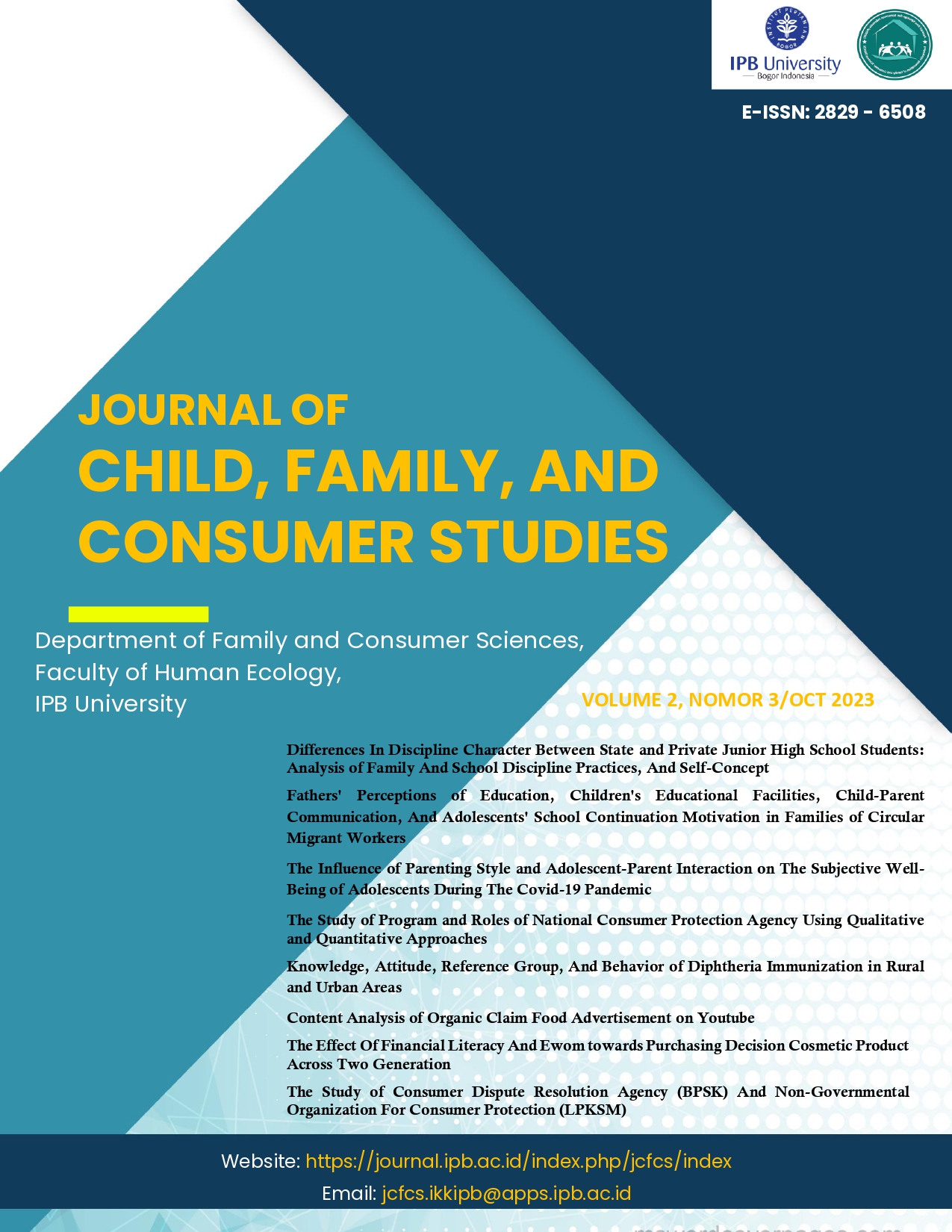KNOWLEDGE, ATTITUDE, REFERENCE GROUP, AND BEHAVIOR OF DIPHTHERIA IMMUNIZATION IN RURAL AND URBAN AREAS
Abstract
Diphtheria is an infectious disease that has been an epidemic in Indonesia and has an average mortality rate of 5-10 percent for children under five years of age. This study aims to 1) analyze the differences and relationships of maternal characteristics, family characteristics, knowledge, attitudes, and reference groups with diphtheria immunization behavior in rural and urban areas; and 2) analyze the effect of maternal characteristics, family characteristics, knowledge, attitudes, and reference groups on diphtheria immunization behavior. This study used a cross-sectional study design. The sample was 41 mothers with children aged 5-12 months and purposively selected at one of the Integrated Services Post in Bogor City and Bogor Regency. The data obtained were processed through coding, input, cleaning, analysis, and interpretation of data. The results showed differences between knowledge, attitude, reference group, and behavior of diphtheria immunization in rural and urban areas. The factor associated with the completeness of diphtheria immunization is social media for rural areas, while it does not exist in urban areas. Factors associated with compliance with the immunization schedule were family size, attitude, interpersonal, and expert for rural areas, and years of education for urban areas. Factors that influence the completeness of immunization are the length of education, attitudes, and interpersonal reference groups. Based on the results of this study, a cross-sectoral role is needed to support community education and educate mothers regarding diphtheria immunization.
References
Anam, R. K., & Muflikhati, I. (2022). Knowledge, attitude, and behavior to prevent Covid-19 infection in Generation Y in Ponorogo Regency, East Java. Journal of Child, Family, and Consumer Studies, 1(2), 142-154. https://doi.org/10.29244/jcfcs.1.2.142-154
Anton, A. (2014). Gambaran pengetahuan, sikap dan perilaku ibu tentang pemberian imunisasi dasar lengkap pada bayi di wilayah kerja Puskesmas Selalong Kecamatan Sekadau Hilir Kabupaten Sekadau. Jurnal Mahasiswa PSPD FK Universitas Tanjungpura, 1(1), 1-16.
Awoh, A. B., & Plugge, E. (2016). Immunisation coverage in rural–urban migrant children in low and middle-income countries (LMICs): a systematic review and meta-analysis. J Epidemiol Community Health, 70(3), 305-311. http://dx.doi.org/10.1136/jech-2015-205652
Budiarti, A. (2019). Hubungan faktor pendidikan, pekerjaan, sikap dan dukungan keluarga terhadap imunisasi dasar di NEIGHBOURHOOD 03 Kelurahan Kedung Cowek Kenjeran Surabaya. Jurnal Kesehatan Mesencephalon, 5(2), 53-58. http://dx.doi.org/10.36053/mesencephalon.v5i2.107
Dinengsih, S., & Hendriyani, H. (2018). Hubungan antara pendidikan, pengetahuan, dukungan keluarga dan peran tenaga kesehatan dengan kepatuhan ibu dalam melakukan imunisasi dasar pada bayi usia 0-12 bulan di desa Aweh Kabupaten Lebak Provinsi Banten. Jurnal Kesehatan Kusuma Husada, 9(2), 202-212. https://doi.org/10.34035/jk.v9i2.281
Harmasdiyani, R. (2015). Pengaruh karakteristik ibu terhadap ketidakpatuhan pemberian imunisasi dasar lengkap pada anak bawah dua tahun. Jurnal Berkala Epidemiologi, 3(3), 304-314.
Hartoyo, E. (2018). Difteri pada anak. Sari Pediatri, 19(5), 301-306.
Hidayat, T. S., & Abas, B. J. (2012). Perilaku pemanfaatan Integrated Services Post hubungannya dengan status gizi dan morbiditas balita. Indonesian Bulletin of Health Research, 40(1), 1-10. https://doi.org/10.22435/bpk.v40i1 Mar.2702.1-10.
Hurlock, E. B. (1986). Developmental psychology. 3rd Ed. New Delhi: McGraw Hill, Inc.
Ilhami, I., & Afif, M. (2020). The influence of family support on providing complete primary immunizations. Jurnal PROMKES, 8(2), 198-205. https://doi.org/10.20473/jpk.V8.I2.2020.198-205
Indriyani, D., & Asih, S. W. (2017). Persepsi ibu muda dan keluarga tentang pemberian imunisasi (pendekatan maternal sensitivity models berbasis keluarga). Jurnal Kesehatan, 5(1), 60-67. https://doi.org/10.25047/j-kes.v5i1.45
Iskandar, L. A. (2009). Gambaran pengetahuan, sikap, dan perilaku ibu bayi terhadap imunisasi dasar lengkap di wilayah kerja Puskesmas Ciumbuleuit, Kecamatan Cidadap, Kota Bandung Tahun 2009. Doctoral dissertation. Universitas Kristen Maranatha.
Istriyati, E. (2011). Faktor-faktor yang berhubungan dengan kelengkapan imunisasi dasar pada bayi di Desa Kumpulrejo Kecamatan Argomulyo Kota Salatiga. Disertasi. Universitas Negeri Semarang.
Jayanti, N., Sulaeman, E. S., & Pamungkasari, E. P. (2017). Effects of predisposing, enabling, and reinforcing factors on completeness of child immunization in Pamekasan, Madura. Journal of Epidemiology and Public Health, 2(2), 106-118. https://doi.org/10.26911/jepublichealth.2017.02.02.02
Jones, A. M., Omer, S. B., Bednarczyk, R. A., Halsey, N. A., Moulton, L. H., & Salmon, D. A. (2012). Parents’ source of vaccine information and impact on vaccine attitudes, beliefs, and nonmedical exemptions. Advances in preventive medicine, 2012. https://doi.org/10.1155/2012/932741
[Kemenkes]. Kementerian Kesehatan RI. (2010). Keputusan Menteri Kesehatan. Gerakan Akselerasi Imunisasi Nasional Universal Child Immunization 2010-2014. Jakarta: Menteri Kesehatan.
_________. Kementerian Kesehatan RI. (2012). Peraturan Kementerian Kesehatan RI. Jakarta: Kemenkes RI.
_________. Kementerian Kesehatan RI. (2017). Data dan Informasi: Profil Kesehatan Indonesia. Jakarta: Kemenkes RI.
Kumar, D., AggaNeighbourhoodal, A., & Gomber, S. (2010). Immunization status of children admitted to a tertiary-care hospital of north India: reasons for partial immunization or non-immunization. Journal of health, population, and nutrition, 28(3), 300-304. https://doi.org/10.3329/jhpn.v28i3.5560
Lumbantoruan, D., & Simanjuntak, L. (2020). Hubungan faktor predisposisi ibu terhadap pemberian imunisasi dasar lengkap di wilayah puskesmas Kecamatan Balige. Jurnal Keperawatan HKBP Balige, 1(2), 17-28.
Mahardika, T. P., & Yuliati, L. N. (2022). The role of courses in influencing smart consumer behaviour of senior high school students in rural and urban areas. Journal of Child, Family, and Consumer Studies, 1(1), 48-59. https://doi.org/10.29244/jcfcs.1.1.48-59
Mulyani, S., Shafira, N. N. A., & Haris, A. (2018). Pengetahuan ibu tentang kelengkapan imunisasi dasar pada bayi. Jurnal Kedokteran dan Kesehatan, 6(1), 45-55. https://doi.org/10.22437/jmj.v6i1.4820
Nadila, T. G. (2022). Hubungan dukungan keluarga, ekonomi dan pengetahuan terhadap kelengkapan imunisasi dasar bayi usia 12 bulan pada masa pandemi Covid-19. Jurnal Interprofesi Kesehatan Indonesia, 2(1), 211-219. https://doi.org/10.53801/jipki.v2i1.45
Ningsih, F., Kasanova, E., & Devitasari, I. (2016). Hubungan peran orang tua dan petugas kesehatan dengan kelengkapan imunisasi pada keluarga yang memiliki bayi usia 0-12 bulan di wilayah kerja Puskesmas Pahandut Kota Palangka Raya. Jurnal SURYA, 8(2), 58-63.
Notoatmodjo, S. (2012). Promosi kesehatan dan perilaku kesehatan. Jakarta: Rineka Cipta.
Odone, A., Ferrari, A., Spagnoli, F., Visciarelli, S., Shefer, A., Pasquarella, C., & Signorelli, C. (2015). Effectiveness of interventions that apply new media to improve vaccine uptake and vaccine coverage: a systematic review. Human vaccines & immunotherapeutics, 11(1), 72-82. https://doi.org/10.4161/hv.34313
Oliver, R. L. (2014). Satisfaction: A behavioral perspective on the consumer: A behavioral perspective on the consumer. New York (US): Routledge.
Pontoh, N. K., Kustiawan, I. (2009). Pengantar Perencanaan Wilayah dan Kota, Bandung: Penerbit ITB.
Rafika, R., Risma, D., & Febrialismanto, F. Hubungan kecerdasan moral dengan self regulation anak di TK Waldha Al Islamy (WHY) Kecamatan Tampan Pekanbaru. Jurnal Online Mahasiswa (JOM) Bidang Keguruan dan Ilmu Pendidikan, 5(2), 318-331.
Rahman, M., & Obaida-Nasrin, S. (2010). Factors affecting acceptance of complete immunization coverage of children under five years in rural Bangladesh. Salud pública de méxico, 52(2), 134-140.
Rahmawati, A. I., & Umbul, C. (2014). Faktor yang mempengaruhi kelengkapan imunisasi dasar di kelurahan krembangan utara. Jurnal berkala epidemiologi, 2(1), 59-70.
Romadhona, M. N. (2015). Binary Bivariate Probit Model on giving basic immunization and breast milk: (Studi Kasus Di Provinsi Kalimantan Selatan Tahun 2013). Jurnal Aplikasi Statistika & Komputasi Statistik, 7(2), 67. https://doi.org/10.34123/jurnalasks.v7i2.24
Samosir, W. (2023). The implementation of the Integrated Services Post program and complete infant immunization at the Tiga Balata Community Health Center. International Journal of Public Health Excellence (IJPHE), 2(2), 492-495. https://doi.org/10.55299/ijphe.v2i2.361
Sherif, M. (2015). Group conflict and co-operation: Their social psychology. New York (NY): Psychology Press.
Syamsu Rijal, & Thamrin Tahir. (2022). Analisis faktor pendorong terjadinya urbanisasi di wilayah perkotaan (Studi Kasus Wilayah Kota Makassar). Journal of Economic Education and Entrepreneurship Studies, 3(1), 262–276. https://doi.org/10.26858/je3s.v3i1.103
Triana, V. (2016). Faktor yang berhubungan dengan pemberian imunisasi dasar lengkap pada bayi tahun 2015. Jurnal kesehatan masyarakat Andalas, 10(2), 123-135. https://doi.org/10.24893/jkma.v10i2.196
Vikram, K., Vanneman, R., & Desai, S. (2012). Linkages between maternal education and childhood immunization in India. Social science & medicine, 75(2), 331-339. https://doi.org/10.1016/j.socscimed.2012.02.043
Wasak, M. P. (2010). Keadaan sosial-ekonomi masyarakat nelayan dl Desa Kinabuhutan Kecamatan Likupang Barat. Kabupaten Minahasa Utara, Sulawesi Utara. Pasific Journal, 3(5), 958-962.
Winarsih, S., Imavike, F., & Yunita, R. (2013). Hubungan peran orang tua dalam pemberian imunisasi dasar dengan status imunisasi bayi di desa wilayah kerja Puskesmas Dringu Kabupaten Probolinggo. Journal of Nursing Science Update (JNSU), 1(2), 135-140.
Winnicott, D. W. (2018). The maturational processes and the facilitating environment: Studies in the theory of emotional development. New York (NY): Routledge.
World Health Organization. 2010. WHO Quality of Life-BREF (WHOQOL-BREF). http://www.who.int/substance abuse/research tools/whoqolbref/en/. Tanggal 31 Oktober 2016. Jam 23.58 WIT
Yuliati, L. N., Retnaningsih, R., & Aprilia, D. (2012). Pengaruh kelompok acuan terhadap kesadaran dan konsumsi beras merah (Oriza Nivara). Jurnal Ilmu Keluarga & Konsumen, 5(2), 166-174. https://doi.org/10.24156/jikk.2012.5.2.166
![]() This work is licensed under a Creative Commons Attribution 4.0 International License.
This work is licensed under a Creative Commons Attribution 4.0 International License.













